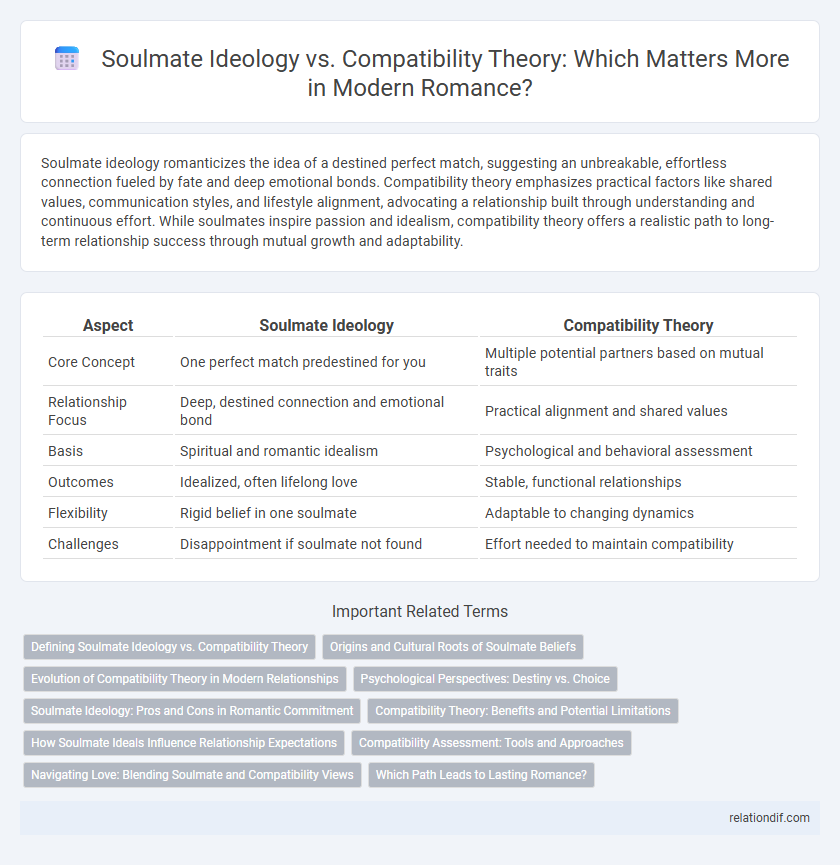Soulmate ideology romanticizes the idea of a destined perfect match, suggesting an unbreakable, effortless connection fueled by fate and deep emotional bonds. Compatibility theory emphasizes practical factors like shared values, communication styles, and lifestyle alignment, advocating a relationship built through understanding and continuous effort. While soulmates inspire passion and idealism, compatibility theory offers a realistic path to long-term relationship success through mutual growth and adaptability.
Table of Comparison
| Aspect | Soulmate Ideology | Compatibility Theory |
|---|---|---|
| Core Concept | One perfect match predestined for you | Multiple potential partners based on mutual traits |
| Relationship Focus | Deep, destined connection and emotional bond | Practical alignment and shared values |
| Basis | Spiritual and romantic idealism | Psychological and behavioral assessment |
| Outcomes | Idealized, often lifelong love | Stable, functional relationships |
| Flexibility | Rigid belief in one soulmate | Adaptable to changing dynamics |
| Challenges | Disappointment if soulmate not found | Effort needed to maintain compatibility |
Defining Soulmate Ideology vs. Compatibility Theory
Soulmate ideology posits that there is one perfect, predestined partner uniquely suited for an individual's soul, creating an intense emotional and spiritual connection. Compatibility theory emphasizes the practical aspects of relationships, focusing on shared values, communication, and mutual respect as key components for sustainable love. Understanding these contrasting perspectives helps clarify whether love is viewed as destiny or a result of deliberate partnership choices.
Origins and Cultural Roots of Soulmate Beliefs
Soulmate ideology traces its origins to ancient Greek philosophy, particularly the myth of Aristophanes in Plato's "Symposium," where souls are depicted as originally joined in pairs and torn apart, seeking reunion. This concept of predestined love resonates through various cultures, including Hindu and Chinese traditions, emphasizing a spiritual and cosmic bond transcending time. In contrast, compatibility theory emerges from psychological and sociological research, rooted in modern cultural shifts that prioritize shared values and interests as foundational to lasting relationships.
Evolution of Compatibility Theory in Modern Relationships
Compatibility theory in modern relationships emphasizes shared values, communication styles, and emotional needs as the foundation for lasting partnerships, contrasting with the soulmate ideology's focus on predestined connections. Research highlights how compatibility evolves through mutual growth, adaptability, and conflict resolution skills, reshaping relationship dynamics in contemporary society. This shift reflects an increased understanding of relational psychology, promoting active partnership development over idealized notions of fate.
Psychological Perspectives: Destiny vs. Choice
Soulmate ideology posits an innate, destined connection between partners, emphasizing fate and the idea of a perfect match predestined to unite. Compatibility theory, grounded in psychological research, stresses conscious choice, mutual effort, and the alignment of values, beliefs, and personality traits as critical for relationship success. Psychological perspectives reveal that while the soulmate belief appeals to emotional idealism, compatibility offers a pragmatic framework emphasizing intentional partner selection and adaptive relationship maintenance.
Soulmate Ideology: Pros and Cons in Romantic Commitment
Soulmate ideology promotes the idea of a single, perfect romantic partner, fostering intense emotional connection and lifelong commitment. This belief can enhance relationship satisfaction but may also create unrealistic expectations, leading to disappointment when conflicts arise. Embracing soulmate ideology without flexibility may hinder problem-solving and long-term compatibility in romantic partnerships.
Compatibility Theory: Benefits and Potential Limitations
Compatibility theory emphasizes practical alignment in values, lifestyles, and emotional needs, fostering long-term relationship stability and mutual growth. This approach allows couples to navigate conflicts effectively by prioritizing shared goals and communication strategies over idealistic notions of destiny. However, its focus on measurable factors may overlook the spontaneous, passionate connections often romanticized by soulmate ideology.
How Soulmate Ideals Influence Relationship Expectations
Soulmate ideals shape relationship expectations by promoting the belief in a perfect, predestined partner, often leading individuals to expect effortless harmony and deep, unconditional connection. In contrast, compatibility theory emphasizes practical factors such as shared values, communication, and problem-solving skills, encouraging realistic assessments of relationship dynamics. The soulmate ideology can create unrealistic standards, increasing disappointment when challenges arise, while compatibility theory fosters resilience through mutual effort and adaptability.
Compatibility Assessment: Tools and Approaches
Compatibility assessment in romance relies on psychological tools like personality tests, attachment style analysis, and communication pattern evaluations to predict relationship success. While soulmate ideology emphasizes destiny and emotional connection, compatibility theory offers measurable criteria through instruments such as the Myers-Briggs Type Indicator (MBTI), the Big Five personality traits, and the Gottman Relationship Checkup. These approaches analyze factors including values alignment, conflict resolution skills, and emotional responsiveness to provide a structured understanding of romantic compatibility.
Navigating Love: Blending Soulmate and Compatibility Views
Navigating love involves balancing the soulmate ideology, which emphasizes an intense, destined connection, with compatibility theory that prioritizes shared values, communication, and practical harmony. Couples who integrate these perspectives foster deeper emotional bonds alongside sustainable relationship dynamics. Embracing both soulmate passion and compatibility ensures a resilient partnership adaptable to life's challenges.
Which Path Leads to Lasting Romance?
Soulmate ideology, rooted in the belief of a predestined perfect match, often overlooks the dynamic effort required to nurture a relationship, while compatibility theory emphasizes shared values, communication, and mutual growth as foundations for enduring love. Studies in relationship psychology suggest that couples focusing on compatibility factors experience higher satisfaction and longevity compared to those relying solely on the concept of soulmates. Embracing compatibility fosters realistic expectations and emotional resilience, essential components for lasting romance.
soulmate ideology vs compatibility theory Infographic

 relationdif.com
relationdif.com